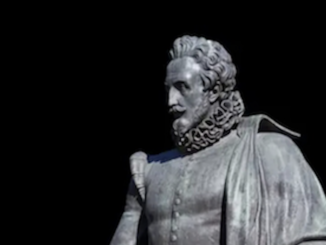
Fotografía oficial de la Presidencia de Colombia, Public domain, via Wikimedia Commons
Upon his elevation, the new pope announced that he had assumed the name of Leo XIV. For those familiar with Leo XIII, this was a signal that the principles of Leo XIII as expressed in his encyclical, Rerum Novarum, would play a major role in the new pontificate. Rerum Novarum is considered to be the Catholic Church’s foundation for social teaching.
Our first inclination might be to determine if Rerum Novarum‘s orientation was politically left or right. That is a mistake. Rerum Novarum must be judged on its own merits, the history of the time, and the opportunities it presents today. And all encyclicals are outside of the scope of papal infallibility. It is reasonable to view encyclicals as a mixture of good ideas and outright error. 134 years have elapsed since Rerum Novarum was published in May of 1891, providing ample time for retrospection.
Popes subsequent to Leo XIII have attempted to expand on Rerum Novarum. The fortieth anniversary of the encyclical was recognized in the encyclical, Quadragesimo Anno, by Pius XI in 1931 during Mussolini’s rule. As revealed in the following Quadragesimo Anno statement, the drift leftward was already apparent in Quadragesimo Anno on the issue of private property:
… when the State brings private ownership into harmony with the needs of the common good, it does not commit a hostile act against private owners but rather does them a friendly service; …
In the real world, the state acts coercively, not through cooperation and competition. Pius XI could not have believed that statement.
Francis I wrote Laudate Si in May 2016, as an extension of both Rerum Novarum and Quadragesimo Anno. For many Catholics, Laudate Si was even more radical, criticizing consumerism and environmental degradation while calling for unified action to reduce global warming.
Notice the name Leo XIV did not take – Francis II. Leo XIV does not appear to be going down the same road as Francis I. Instead, it appears that Leo XIV will be getting back to Rerum Novarum. The result could be an enrichment of the Church’s social teaching.
Should Catholics simply fall back on Rerum Novarum, or does that encyclical need to be updated? Is there a major weakness in Rerum Novarum? Yes. It is its fixation with class. There are 33 mentions of class in 64 paragraphs. Leo XIII was an intellectual, but it is unlikely he would have understood the significance of major events that were unfolding, including the discovery of the New World and the British Agricultural Revolution, both of which prepared for the Industrial Revolution. It is unlikely he would have been familiar with Richard Cantillon and Essay on the Nature of Trade in General, where the critical role of entrepreneurship was first described. We know, for example, that there is not a single mention of entrepreneurship in Rerum Novarum. This suggests that Leo XIII had a very different model of economic thinking than what we now describe as the Austrian school. Contrast Leo XIII’s economic class fixation with the lesson clearly conveyed by Cantillon in Essay’s Part I, Chapter 13, The Circulation and Exchange of Goods, As Well As the Production of Goods and Merchandise, Are Carried Out in Europe in Conditions of Risk:
Even beggars and thieves are entrepreneurs in this category [in that they work under uncertainty].
In other words, entrepreneurship is an attribute that is free of economic class. It is open to all. Entrepreneurship leads to a better understanding of Professor Boudreaux’s Hockey Stick of Human Prosperity, which describes how suddenly humanity went from impoverishment to relative enrichment. Leo XIII, on the other hand, had fixated on class at a time when economic class had become irrelevant.
There are other economic errors in Rerum Novarum, including Leo XIII’s call for a “fair wage” for labor. But government as a substitute for the free market in establishing labor rates is a therapy more damaging than the disease. Leo XIV is not likely to pursue that.[i]
The Opportunity
The opportunity is in the reassessment of Rerum Novarum rather than as an extension of Quadragesimo Anno or Laudate Si. There is a lot of potential common ground with the principles of classical liberalism in Rerum Novarum. For example, Paragraph 15 of Rerum Novarum contains this warning about collectivisms:
… it is clear that the main tenet of socialism, community of goods, must be utterly rejected, since it only injures those whom it would seem meant to benefit, is directly contrary to the natural rights of mankind, and would introduce confusion and disorder into the commonweal. The first and most fundamental principle, therefore, if one would undertake to alleviate the condition of the masses, must be the inviolability of private property. This being established, we proceed to show where the remedy sought for must be found.
This follows in Paragraph 19:
The great mistake … is to take up with the notion that class is naturally hostile to class, and that the wealthy and the working men are intended by nature to live in mutual conflict. So irrational and so false is this view that the direct contrary is the truth. Just as the symmetry of the human frame is the result of the suitable arrangement of the different parts of the body, so in a State is it ordained by nature that these two classes should dwell in harmony and agreement, so as to maintain the balance of the body politic. Each needs the other: capital cannot do without labor, nor labor without capital. Mutual agreement results in the beauty of good order, while perpetual conflict necessarily produces confusion and savage barbarity. Now, in preventing such strife as this, and in uprooting it, the efficacy of Christian institutions is marvellous and manifold. First of all, there is no intermediary more powerful than religion (whereof the Church is the interpreter and guardian) in drawing the rich and the working class together, by reminding each of its duties to the other, and especially of the obligations of justice.
The way is open to build a bridge between Catholic social teaching and classical liberalism. That need not create dependency between the two realms. Instead, the opportunity is in demonstrating that the free market model of social cooperation/competition can deliver more prosperity to the masses than the model of contention on which all politics is based.
[i] Members of the Austrian school of economics might ask, “How does Ludwig von Mises thinking relate to Rerum Novarum?” Rerum Novarum was written in 1891, Quadragesimo Anno was written in 1931, but Mises major work, Human Action, was published in 1949. The latter introduced the idea that the study of economics was just one part of the larger study of praxeology, the study of all human action. The first 199 pages of Mises’ Human Action describe the general principles upon which praxeology is based. Much has been written about one realm of human action, the law, but humans also operate simultaneously in other realms to include civility, charity, mercy and forgiveness. Thus, there is a significant area of human action that remains to be explored outside of economics, but consistent with Austrian economics.
© Phil Duffy 2025



